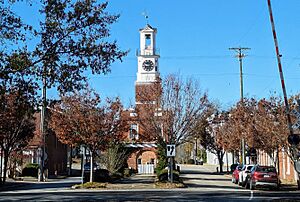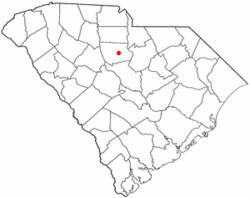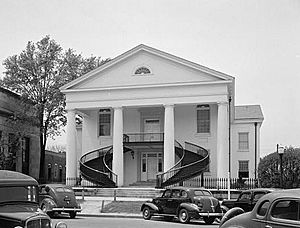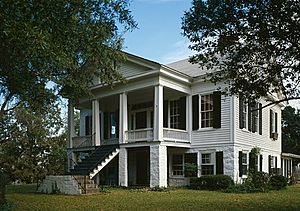Winnsboro, South Carolina facts for kids
Quick facts for kids
Winnsboro, South Carolina
|
||
|---|---|---|
 |
||
|
||
| Nickname(s):
Rock City
|
||
| Motto(s):
"A Town for All Time"
|
||

Location of Winnsboro, South Carolina
|
||
| Country | United States | |
| State | South Carolina | |
| County | Fairfield | |
| Area | ||
| • Total | 3.52 sq mi (9.13 km2) | |
| • Land | 3.52 sq mi (9.13 km2) | |
| • Water | 0.00 sq mi (0.00 km2) | |
| Elevation | 535 ft (163 m) | |
| Population
(2020)
|
||
| • Total | 3,215 | |
| • Density | 912.32/sq mi (352.23/km2) | |
| Time zone | UTC-5 (Eastern (EST)) | |
| • Summer (DST) | UTC-4 (EDT) | |
| ZIP code |
29180
|
|
| Area code(s) | 803, 839 | |
| FIPS code | 45-78460 | |
| GNIS feature ID | 1251474 | |
Winnsboro is a town located in Fairfield County, South Carolina, United States. In 2020, about 3,215 people lived there. Winnsboro is the main town, or county seat, of Fairfield County. It is also part of the larger Columbia metropolitan area.
Contents
History of Winnsboro
Long ago, this area was home to different groups of indigenous peoples. Archeologists have found proof that people lived here as far back as 1500 BC. A place called Blair Mound nearby shows that people from the Mississippian culture lived there around 1300-1400 AD.
Early Settlement and Naming
Before the American Revolutionary War, a man named Richard Winn moved from Virginia to this part of South Carolina. His land included the area where Winnsboro is today. By 1777, the settlement was known as "Winnsborough" because Richard Winn owned so much land. His brothers, John and Minor Winn, also moved there.
In 1785, the town was officially started by Richard and John Winn, along with John Vanderhorst. All three Winn brothers fought in the Revolutionary War. Richard became a general and was known for fighting in many battles. John became a colonel.
Cotton and Textile Mills
After 1793, when Eli Whitney invented the cotton gin, growing short-staple cotton became very profitable. This type of cotton was hard to process before the gin. Because of this, many cotton plantations grew in the area. This led to a huge increase in the demand for enslaved labor. Many African Americans were forced to move to this region. By the time of the American Civil War, most people in Fairfield County were enslaved African Americans.
Later, in the late 1800s, Textile mills were built in the area. At first, only white people were allowed to work in these mills. There's even an old folk song from the 1930s called "Winnsboro Cotton Mill Blues." It talks about working in a cotton mill in this town. The song has been sung by famous artists like Lead Belly and Pete Seeger.
Historic Places
Many places in Winnsboro are listed on the National Register of Historic Places. These include old archeological sites and buildings that show the town's history. Some examples are Albion, Blair Mound, Concord Presbyterian Church, and the Winnsboro Historic District. The Winnsboro Town Clock, built in 1837, is also special. It is the oldest clock in the United States that has been running continuously.
Geography
Winnsboro is located in the eastern part of Fairfield County. Major roads like U.S. Route 321 and South Carolina Highway 34 go around the west side of town. US 321 Business runs through the center of Winnsboro. US 321 goes north to Chester (about 25 miles) and south to Columbia (about 28 miles). The town covers an area of about 3.52 square miles (9.13 square kilometers), and it's all land.
Population Information
| Historical population | |||
|---|---|---|---|
| Census | Pop. | %± | |
| 1860 | 355 | — | |
| 1870 | 1,124 | 216.6% | |
| 1880 | 1,500 | 33.5% | |
| 1890 | 1,738 | 15.9% | |
| 1900 | 1,765 | 1.6% | |
| 1910 | 1,754 | −0.6% | |
| 1920 | 1,822 | 3.9% | |
| 1930 | 2,344 | 28.6% | |
| 1940 | 3,181 | 35.7% | |
| 1950 | 3,267 | 2.7% | |
| 1960 | 3,479 | 6.5% | |
| 1970 | 3,411 | −2.0% | |
| 1980 | 2,919 | −14.4% | |
| 1990 | 3,475 | 19.0% | |
| 2000 | 3,599 | 3.6% | |
| 2010 | 3,550 | −1.4% | |
| 2020 | 3,215 | −9.4% | |
| U.S. Decennial Census | |||
Population in 2020
In 2020, there were 3,215 people living in Winnsboro. There were 1,329 households and 878 families.
| Race | Num. | Perc. |
|---|---|---|
| Black or African American (non-Hispanic) | 1,926 | 59.91% |
| White (non-Hispanic) | 1,078 | 33.53% |
| Native American | 14 | 0.44% |
| Asian | 26 | 0.81% |
| Pacific Islander | 1 | 0.03% |
| Other/Mixed | 89 | 2.77% |
| Hispanic or Latino | 81 | 2.52% |
Population in 2010
In 2010, Winnsboro had 3,550 people. About 60.3% of the people were African American, and 36.1% were White.
Education in Winnsboro
Winnsboro is served by the Fairfield County Public School system. The schools have about 2,414 students from pre-kindergarten to 12th grade. There are 10 students for every teacher. About 25.1% of students are good at math, and 31% are good at reading. The graduation rate for the district is 78.1%. Winnsboro also has a public library, which is part of the Fairfield County Library.
Notable People from Winnsboro
Many interesting people have come from Winnsboro, including:
- Mike Anderson: A professional football player for the Baltimore Ravens. He was named NFL Offensive Rookie of the Year in 2000.
- Webster Anderson: A U.S. Army soldier who received the Medal of Honor for his bravery in the Vietnam War.
- John Bratton: A Confederate general during the Civil War and later a U.S. congressman.
- William Ellison: Born enslaved, he bought his freedom and became a successful businessman and planter.
- Kelly Miller: An important African-American mathematician, sociologist, and writer.
- Miriam Stevenson: She was crowned Miss Universe 1954.
- Tyler Thigpen: A professional football quarterback for the Buffalo Bills.
See also
 In Spanish: Winnsboro (Carolina del Sur) para niños
In Spanish: Winnsboro (Carolina del Sur) para niños
 | Audre Lorde |
 | John Berry Meachum |
 | Ferdinand Lee Barnett |



